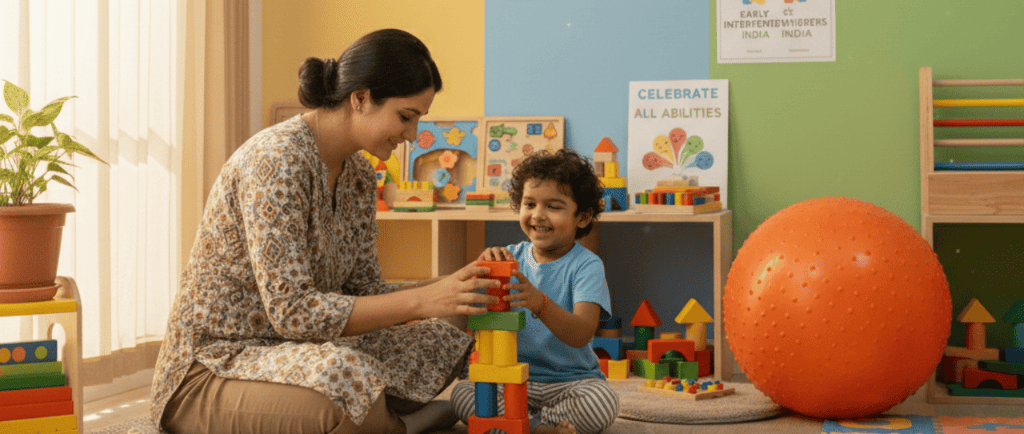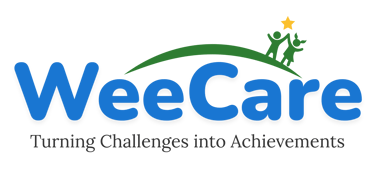The Importance of Early Intervention for Children with Autism in India
Understand Why Early Intervention is Important in India.
PLAY THERAPYOCCUPATIONAL THERAPYSENSORY INTEGRATIONEARLY INTERVENTION
Dr. Dipak Kumar
10/6/20256 min read


Autism Spectrum Disorder (ASD) is a lifelong neurodevelopmental condition characterized by differences in communication, social interaction, and behavior. In India today, an estimated 1 in 65 children aged 2–9 years is on the autism spectrum (Indian Pediatrics). This means nearly two million children in the country are affected.
The numbers are rising, partly due to better awareness and diagnosis. But there’s still a big challenge: most children in India are diagnosed late, often after age 3 or 4, when precious early years for brain development are already gone (International Journal of Pediatrics).
Research worldwide shows one clear truth: the earlier a child starts therapy, the better the long-term outcomes. The first five years of life are a golden window for brain growth, learning, and adaptability. For children with autism, this is the period where therapy can make the most difference in language, social skills, and independence.
In this blog, we’ll explore why early intervention matters so much, what therapies are most effective, the situation in India today, and how parents can take action right away.
Why the Early Years Are Crucial
The human brain develops most rapidly during the first five years of life. Pathways for language, motor skills, and social interaction are being laid down at lightning speed. Neuroscientists call this neuroplasticity — the brain’s ability to reorganize and adapt (Frontiers in Neuroscience).
For children with autism, this period is even more important. Research shows that delays in interventions can be costly because the brain’s critical periods for language and social skills begin closing by age five (The Lancet Child & Adolescent Health).
One landmark study of the Early Start Denver Model (ESDM) — a play-based behavioral therapy — showed that toddlers who began therapy between 18–30 months improved their IQ by an average of 18 points, compared to just 4 points in children who started later (University of Washington). Several even progressed enough to move into mainstream classrooms.
The lesson is clear: skills are much easier to teach before lifelong patterns set in. Every month counts when your child is between one and three years old.
What Early Intervention Looks Like
Early intervention doesn’t mean one specific program. It’s a combination of therapies and strategies that help build a foundation for communication, learning, and daily living.
Here are the most common interventions:
Speech Therapy: Helps children learn to babble, point, speak words, and understand language. Starting as soon as delays are noticed can boost communication dramatically.
Occupational Therapy (OT): Improves fine motor skills (like grasping and drawing), self-care skills (like feeding or dressing), and regulates sensory processing.
Applied Behavior Analysis (ABA): A structured method that uses rewards and reinforcement to teach communication, social, and academic skills. Programs like ESDM adapt ABA for play-based learning.
Naturalistic Developmental Behavioral Interventions (NDBIs): Therapies like the COM DEALL approach in India train parents to use everyday routines as teaching opportunities. A study showed that even online parent training led to big improvements in toddlers’ skills (Indian Journal of Pediatrics).
Parent Training: Parents are coached to continue therapy at home. This is one of the strongest predictors of progress because children spend most of their time with family.
The goal is not to “cure” autism but to equip children with essential skills early — asking for needs, interacting with peers, tolerating changes, and eventually learning in a school environment.
Autism in India: Awareness and Diagnosis
India has made progress, but challenges remain:
Typical Age of Diagnosis: Parents often notice differences around age 2.8 years, but diagnosis happens only around 3.9 years on average. Therapy usually starts even later, around 4.2 years (International Journal of Pediatrics).
Reasons for Delay: Lack of screening in routine check-ups, stigma, low awareness among pediatricians, and misconceptions (“boys talk late,” “he’s just shy”).
Rising Awareness: World Autism Awareness Day, parent groups, and organizations like Action for Autism (Delhi) and Autism Society of India are educating families and professionals.
Government Recognition: Autism is officially listed as a disability under the Rights of Persons with Disabilities Act (2016), making children eligible for services and support (Indian Pediatrics).
The good news is that more parents are now seeking help by age 2–3, but rural areas still face long delays.
Therapy Centers and Programs in India
Several pioneering organizations in India provide early intervention:
Communication DEALL – Founded in Bangalore, this program uses play-based therapies and parent training. A long-term study found that 65 of 71 children in the program later joined mainstream schools.
Action for Autism (AFA) – Based in Delhi, AFA was the first autism NGO in India. It provides therapy, teacher training, and extensive parent resources.
Autism Society of India (ASI) – Focuses on advocacy, awareness, and training professionals across states.
Hospital Centers: Institutes like NIMHANS (Bangalore), AIIMS (Delhi), and AIISH (Mysuru) offer assessment and therapy through specialized clinics.
Local Therapy Centers: Most metro cities now have multidisciplinary centers offering speech, OT, and ABA therapy. Many also provide online sessions for families in smaller towns.
Government Schemes That Support Early Intervention
The Government of India has introduced schemes through the National Trust to support families:
Disha Scheme: Early intervention centers for children with autism and other disabilities, ages 0–10.
Niramaya Health Insurance: Affordable health insurance (up to ₹1 lakh coverage) for therapy, check-ups, and medicines.
Rashtriya Bal Swasthya Karyakram (RBSK): Screens children for developmental delays and disabilities during early childhood.
Parents should ask their pediatrician or local disability office about these programs.
Real Stories from Indian Parents and Therapists
Stories from parents across India show why acting early matters:
Darsha Hebbar (Bangalore): Her daughter started therapy at 2 years 2 months. By age six, she had joined a Montessori school. “Because we started early, she could adapt quickly,” Darsha says (The Hindu).
Gayatri Ananth, Speech Therapist (Chennai): “Unlike a genetic disorder, the more therapy we provide in autism, the more the chances of the child becoming near normal. The older he/she gets, the essential years are gone” (The Hindu).
Dr. Aparna Kallakuri (Hyderabad): Noticed “something was strange” in her son at 15 months. Early therapy helped him start communicating. She advises parents: “If you feel something is strange, seek help. Do not worry about what society thinks.”
These voices remind us: parents are the first advocates for their children.
Online and Teletherapy Options
During COVID, many therapy centers in India shifted online. Studies show that tele-therapy can be nearly as effective as in-person therapy for parent-mediated interventions (Indian Journal of Pediatrics).
This is especially important for families in small towns. With a smartphone and internet connection, parents can now access expert guidance from major centers in Delhi, Bangalore, or Chennai.
Taking Action: What Parents Can Do
If you’re a parent of a toddler, here are practical steps:
Watch for Red Flags Early: Lack of eye contact, no babbling by 12 months, no words by 16 months, repetitive actions, or lack of pointing/gestures.
Don’t Wait for Others: If you feel something is wrong, seek help immediately. You don’t need to wait for school to start.
Request Screening: Ask your pediatrician for a developmental screening at 18 and 24 months.
Start Therapy Quickly: Even before a formal diagnosis, you can begin speech and occupational therapy.
Use Government Support: Apply for disability certificates and explore Disha and Niramaya schemes.
Get Involved: Learn therapy techniques from professionals. Practice at home daily. Your involvement accelerates progress.
Join Parent Networks: Connect with groups run by AFA or ASI. Shared experiences provide both hope and practical guidance.
The journey with autism is unique for every child, but one thing is universal: starting early changes outcomes. The first five years are a window we cannot afford to miss.
With growing awareness in India, more parents are acting sooner, and organizations are stepping up to support them. Government schemes, therapy centers, and even online platforms now make it possible for families everywhere — not just in big cities — to start early intervention.
As The Times of India noted, with the right therapy and support, many children with autism “can lead fulfilling, almost normal lives.”
The message for parents is clear: if you suspect delays, don’t wait. Act today. The earlier you begin, the brighter your child’s future can be.
References:
Prevalence and Policy Recognition –
“Autism spectrum disorder in India: A scoping review” – Indian Pediatrics (2021)
https://www.indianpediatrics.net/jan2021/jan-91-98.htmAverage Age of Diagnosis in India –
“Autism Spectrum Disorder: Indian Scenario” – International Journal of Pediatrics (2019)
https://www.hindawi.com/journals/ijpedi/2019/4307353/Critical Window for Brain Development –
“Early Childhood Development and the Brain” – Frontiers in Neuroscience
https://www.frontiersin.org/articles/10.3389/fnins.2019.00883/fullDelays in Intervention are Costly –
“Early detection and intervention for autism spectrum disorder: Global perspectives” – The Lancet Child & Adolescent Health (2022)
https://www.thelancet.com/journals/lanchi/article/PIIS2352-4642(21)00330-0/fulltextEvidence for Early Start Denver Model (ESDM) –
“Study shows early intervention benefits young children with autism” – University of Washington News
https://www.washington.edu/news/2009/11/30/study-shows-early-intervention-benefits-young-children-with-autism/Systematic Review of Early Interventions –
“A systematic review on the effectiveness of early intervention in autism spectrum disorder” – Indian Journal of Pediatrics (2020)
https://link.springer.com/article/10.1007/s12098-020-03219-2Parent and Therapist Quotes, Success Stories –
The Hindu: “For children with autism, the earlier the better” (2013)
https://www.thehindu.com/news/cities/bangalore/for-children-with-autism-the-earlier-the-better/article4593563.eceTimes of India Editorial on Autism Awareness –
“Autism in India: Rising awareness, better diagnosis” (2017)
https://timesofindia.indiatimes.com/home/sunday-times/deep-focus/autism-in-india-rising-awareness-better-diagnosis/articleshow/57944288.cmsCom DEALL Early Intervention Program –
http://communicationdeall.orgAction for Autism (AFA), Delhi –
https://www.autism-india.orgAutism Society of India (ASI) –
https://www.autismsocietyofindia.orgThe National Trust (Government of India) – Disha & Niramaya Schemes –
http://thenationaltrust.gov.in
Connect
Reach out for personalized child support
CONTACT US
Join our community
info@weecare.in
+91-8877 3535 14
WeeCare© 2025. All rights reserved.


Important links
We Accept


